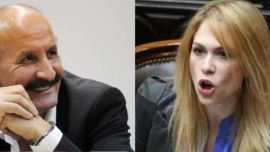Perhaps it is just wishful thinking, but since, less than a fortnight ago, the so-called primary elections turned Argentine politics upside down, some commentators and politicians have been considering the intriguing possibility that people who live in the country’s squalid urban slums could be acquiring a taste for free-market capitalism. Impressed by the performance of Javier Milei, the studiously unkempt and often raucous young economist who enjoys quoting Ludwig von Mises, Friedrich Hayek and other luminaries of the Austrian School who got almost 14 percent of the votes in Buenos Aires City, as well as the respectable but hardly overwhelming number picked up by the veteran Ricardo López Murphy and, in the homonymous Province, José Luis Espert who share many of their ideas, they suggest that liberalism (in the European sense of the word, not the very different North American one), could well be the coming thing.
Those who think this way assume that Peronism, especially the until recently dominant Kirchnerite variant, is on the wane and will leave behind a void something equally potent will eventually fill. Could this something be the no-holds-barred liberalism proposed by Milei and his followers? Though few can have been swayed by the economist’s learned allusions to theories which were cooked up in Vienna a century ago and proved fairly influential in Europe and the Anglo-Saxon world (Margaret Thatcher was very fond of Hayek’s viewpoints), many clearly liked hearing him berate the country’s “political caste” for its countless crimes and follies. Not surprisingly, this went down very well among people who see themselves as victims of decades of misgovernment by a pack of unscrupulous charlatans more interested in feathering their own nests than in catering for the needs of their compatriots.
Milei’s cause is helped by the insistent habit not just of the Kirchnerites and other Peronists, but also of Radicals, leftists and assorted progressives, of using “liberal” or, worse still, “neoliberal” as an insult. To this they can respond by saying that if stepping aside and letting the market work its magic is the only alternative to leaving everything in the hands of politicians who have ruined a country which, had it not been for them, would in all likelihood be rolling in money, it is precisely what poverty-stricken people need most. They can also remind voters that in the rest of the world, including China, free-market capitalism has worked wonderfully well, so there is no reason why it should not do the same in Argentina.
This is not the first time that advocates of economic liberalism have mounted a strong challenge to the prevailing corporatist orthodoxies. In the late 1980s, Alvaro Alsogaray’s party startled both the Radicals and Peronists by staging big rallies in stadia such as River Plate’s and coming third in the national elections. However, after joining forces with Carlos Menem, whose government adopted many of his ideas, Alsogaray’s supporters got swallowed up by the omnivorous Peronist movement. Some were disgorged when after Menem, the Peronists reverted to type, or, like the former vice-president under Cristina Fernández de Kirchner, Amado Boudou, they decided to stay put and take advantage of whatever opportunities came their way. This is what Boudou did; as a result, he was sent to jail for corruption. The same happened to Alsogaray’s daughter, María Julia; her law-breaking may have been far less flagrant than that of many members of the country’s political elite but unfortunately for her she was not shielded from prosecution by powerful allies.
Peronists, stunned by what happened to them in the primaries, in which nationwide they got less than a third of the vote, have surely taken note of the sudden appearance of liberal sentiments in the ramshackle shantytowns of Greater Buenos Aires they think they own. For many, the temptation to take a leaf out of Menem’s playbook and astonish the world by singing the praises of free-market capitalism must be very strong. Even Cristina, who when it suited her professed to be a fervent admirer of Menem and Domingo Cavallo, could join in and pray that such a transformation would help save her from ending her days behind bars.
Would Milei and Espert do what Alsogaray did and let them get away with stealing their ideas because, after all, it would mean they had won a battle in the long war against what they see as populist collectivism? Or would they take their cue from López Murphy and refuse to associate themselves with individuals they regard as unprincipled opportunists, not only for ethical reasons but also because they are convinced that the end result of their alleged conversion to free enterprise would be yet another dose of corrupt cronyism which would discredit everything they stand for? Were that to happen, the Peronists would remind stand-offish liberals that, without a firm political base, no government could push through the drastic economic and social reforms they are demanding.
Argentina is in a bind. The established order is unsustainable; at any moment, it could collapse entirely. However, replacing it with a better one, whether ultraliberal or only slightly market-friendly, would be bound to prove extremely difficult. Politicians talk longingly about how good it would be for the country to adopt a “Scandinavian” model, but turning Argentines into Spanish-speaking Swedes, Norwegians or Danes would require a thoroughgoing cultural revolution that is most unlikely to take place.
If slum-dwellers, whose numbers are quickly growing, did decide that what some call “anarcho-capitalism” as preached by people like Milei really did offer them a way out of the hole they have been herded into by the Peronists and, less vigorously, by well-meaning Radicals, their leaders would then face the problem summed up in the well-known joke about the tourist who asked for directions in Dublin and was told: “Well sir, if I were you, I wouldn’t start from here.”
For some time to come, a great many people will continue to need hand-outs because without them they would starve. What is more, to be able to function properly, the kind of economy liberals and libertarians dream of would need a well-prepared workforce which simply does not exist now in Argentina and, in the best of circumstances, would require years of single-minded effort to bring about. Even removing the many obstacles to production which are holding the economy back could have traumatic consequences for large numbers of men and women who have grown accustomed to the way things have long been and understandably fear that the changes they see fast approaching could make their lives even harder.



















Comments